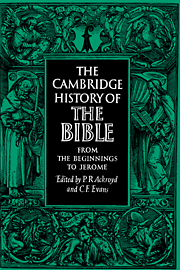Book contents
- Frontmatter
- I LANGUAGE AND SCRIPT
- II BOOKS IN THE ANCIENT WORLD
- III THE OLD TESTAMENT
- IV THE NEW TESTAMENT
- V THE BIBLE IN THE EARLY CHURCH
- 13 BIBLICAL EXEGESIS IN THE EARLY CHURCH
- 14 ORIGEN AS BIBLICAL SCHOLAR
- 15 THEODORE OF MOPSUESTIA AS REPRESENTATIVE OF THE ANTIOCHENE SCHOOL
- 16 JEROME AS BIBLICAL SCHOLAR
- 17 AUGUSTINE AS BIBLICAL SCHOLAR
- 18 THE PLACE OF THE BIBLE IN THE LITURGY
- Bibliography
- Abbreviations
- Notes on the Plates
- Indexes
- Plate Section">
- References
15 - THEODORE OF MOPSUESTIA AS REPRESENTATIVE OF THE ANTIOCHENE SCHOOL
from V - THE BIBLE IN THE EARLY CHURCH
Published online by Cambridge University Press: 28 March 2008
- Frontmatter
- I LANGUAGE AND SCRIPT
- II BOOKS IN THE ANCIENT WORLD
- III THE OLD TESTAMENT
- IV THE NEW TESTAMENT
- V THE BIBLE IN THE EARLY CHURCH
- 13 BIBLICAL EXEGESIS IN THE EARLY CHURCH
- 14 ORIGEN AS BIBLICAL SCHOLAR
- 15 THEODORE OF MOPSUESTIA AS REPRESENTATIVE OF THE ANTIOCHENE SCHOOL
- 16 JEROME AS BIBLICAL SCHOLAR
- 17 AUGUSTINE AS BIBLICAL SCHOLAR
- 18 THE PLACE OF THE BIBLE IN THE LITURGY
- Bibliography
- Abbreviations
- Notes on the Plates
- Indexes
- Plate Section">
- References
Summary
Fourth-century Antioch was an outstanding centre of biblical scholarship and of ecclesiastical confusion. The former was not the primary cause of the latter, but the two were not wholly unconnected. Both characteristics were already features of the Antiochene scene in the third century. Paul of Samosata, bishop of Antioch in A.D. 268, was the first bishop to be excommunicated and deposed by a Church Council for unorthodoxy—and the first to defy that ban by staying on in possession of the Church's buildings until turned out by the civil authorities. Lucian, a presbyter at Antioch in the years after Paul's deposition, was probably the most learned biblical scholar (apart from Origen) in the whole history of the Church before Nicaea. Yet we know comparatively little of either of these men, for one was regarded as a heretic of heretics in his own right and the other as tarred with the same brush at one remove in his capacity as the supposed father of Arianism.
The leading figures of the Antiochene school of biblical scholarship in the fourth century were staunch upholders of the faith of Nicaea. Yet they probably stand much closer in approach to Paul and to Lucian than they would ever have been prepared to admit. There is the same emphasis on the biblical text, on historical fact and on the humanity of Jesus, which we can already detect in the scanty and biased accounts of Paul and Lucian. And it was the same feature of their fundamental approach—their beginning from below, their stress on the human aspect—which got them into trouble also with later standards of orthodoxy.
Keywords
- Type
- Chapter
- Information
- The Cambridge History of the Bible , pp. 489 - 510Publisher: Cambridge University PressPrint publication year: 1970
References
- 4
- Cited by

